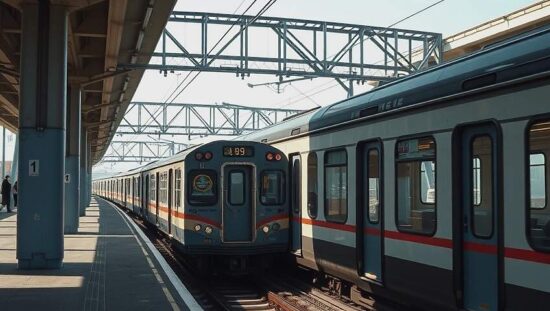Deutsche Bahn has unveiled its new timetable for 2026, marking a significant expansion and standardization of its long-distance rail services. A key highlight is the planned connection of 21 cities to high-speed rail lines at half-hour intervals starting December 14th – more cities than ever before. The network benefiting from this increased frequency will expand from 900 to 2,300 kilometers, impacting routes such as those between Hamburg, Hannover and Kassel and Erfurt, Halle and Berlin.
To bolster North-South connections, 14 new high-speed ICE (Intercity-Express) services are slated to strengthen the Hamburg-Frankfurt (Main) and Berlin-Munich axes. A notable improvement is a new express service between Berlin and Stuttgart via Nuremberg, reducing the journey time to approximately 4 hours and 45 minutes.
International connections are also being significantly enhanced. A new Eurocity line will link Leipzig and Krakow in Germany and Poland. Increased high-speed ICE connections are planned between North Rhine-Westphalia and both Zurich and Chur in Switzerland, with the inclusion of Brig – both from North Rhine-Westphalia and towards Berlin.
A direct connection between Prague and Copenhagen will launch in May 2026, routing through Dresden, Berlin and Hamburg, potentially adding up to four daily trains between Hamburg and Copenhagen during peak season. From September 2026, four daily ICE services will connect Cologne and Antwerp, with Brussels Airport now integrated into the ICE network.
To streamline operations and improve reliability, Deutsche Bahn is standardizing departure and arrival stations, intermediate stops and timetable frequencies on key ICE lines wherever possible. The goal is to utilize the same ICE train model for the majority of services, mirroring the simplicity of suburban rail systems. This will inevitably lead to some alterations in existing direct connections; for example, Kiel will receive a consistent two-hour interval service towards Hannover, Frankfurt and Stuttgart.
Deutsche Bahn is also phasing out the practice of splitting and rejoining ICE trains, a strategy sometimes employed to increase direct connections but prone to delays. Due to economic pressures and rising costs, some very low-demand services are being reduced. For instance, the route between Leipzig and Nuremberg, via Jena, will see a reduction in service frequency from five to two trains daily.
The new timetable will also see the introduction of the ICE L train, initially deployed between Berlin and Cologne. Following the completion of track renovations, ICE L services will extend to Westerland (Sylt) from May 2026 and subsequently from Cologne, Frankfurt, Dortmund and to Oberstdorf.
Passengers will benefit from expanded booking options, with the ability to purchase tickets for Austrian ÖBB and Swiss SBB trains, alongside many French TGV services and Eurostar connections directly through the Deutsche Bahn website. Night trains operated by ÖBB are also now available for booking. Deutsche Bahn aims to offer tickets for all major neighboring rail operators by the end of 2026.
Various infrastructure projects are underway, including track renovations on the Hamburg-Berlin line (until April 2025), requiring service diversions. Planned works will also impact routes between Hagen and Cologne, Nuremberg and Passau and the Rhine line between Cologne and Frankfurt.
New connections will be available for booking on the Deutsche Bahn website from October 15th, with ticket sales beginning at that time. Advance bookings can be made up to twelve months in advance.





